Yoel Rappel | |
|---|---|
 | |
| Born | Yoel Rappel |
| Alma mater | Boston University, Ph.D. |
| Occupation | historian |
Yoel Rappel, also known as Joel Rappel, is an Israeli historian who specializes in the study of Jewish history and the evolution of Jewish prayer.
Yoel Rappel | |
|---|---|
 | |
| Born | Yoel Rappel |
| Alma mater | Boston University, Ph.D. |
| Occupation | historian |
Yoel Rappel, also known as Joel Rappel, is an Israeli historian who specializes in the study of Jewish history and the evolution of Jewish prayer.
Rappel is the son of Israeli historian Dov Rappel and grew up on Kibbutz Yavneh. [1]
Rappel received his Ph.D. in Jewish history and rabbinic literature from Boston University. In addition to teaching at Boston University, Rappel has taught at Bet Berl College and the Avshalom Institute for Israel Studies. He has published 29 books and edited 80 academic articles. As a fellow at the Elie Wiesel Center for Jewish Studies at Boston University, Rappel specializes in the study of Jewish history and the evolution of Jewish prayer. [2] [2] He previously worked for 40 years as a journalist and senior program editor at the Israel Broadcasting Authority. [2]
In 2018, Rappel's research confirmed that Rabbi Yitzhak HaLevi Herzog, the first Ashkenazi Chief Rabbi of Israel and the grandfather of Israeli President Isaac Herzog, wrote the Prayer for the Welfare of the State of Israel, settling a decades-long academic dispute over the prayer's authorship. Rappel's findings were corroborated by the National Library of Israel. [3]
In 2009, Boston University professor Elie Wiesel, arguably the most famous Holocaust survivor, asked Rappel to organize and manage his archive, which contained approximately one million documents. [4] Over 7 years, Rappel curated the archive. [4] Rappel was also the Hebrew editor for Wiesel's books. [2]
Rappel discovered a never-published Hebrew-language version Night , Wiesel's famous memoir about his experiences during the Holocaust. The archived version included harsh criticisms of Jews who were too optimistic about the future, Jewish leaders who did not speak up, and Wiesel's Hungarian neighbors who "joyously watched the Jews" being deported. These were not included in the originally published 1960 version. [4]
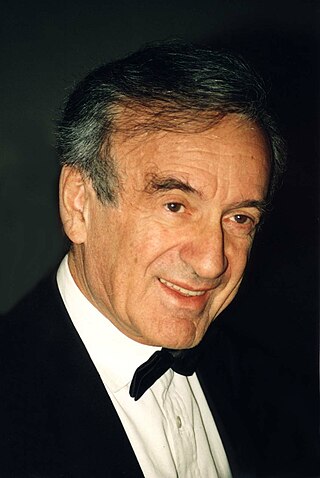
Eliezer "Elie" Wiesel was a Romanian-born American writer, professor, political activist, Nobel laureate, and Holocaust survivor. He authored 57 books, written mostly in French and English, including Night, a work based on his experiences as a Jewish prisoner in the Auschwitz and Buchenwald concentration camps.

Holocaust theology is a body of theological and philosophical debate concerning the role of God in the universe in light of the Holocaust of the late 1930s and early 1940s. It is primarily found in Judaism. Jews were killed in higher proportions than other groups; some scholars limit the definition of the Holocaust to the Jewish victims of the Nazis as Jews alone were targeted for the Final Solution. One third of the total worldwide Jewish population were killed during the Holocaust. The Eastern European Jewish population was particularly hard hit, being reduced by ninety percent. While a disproportionate number of Jewish religious scholars were killed, more than eighty percent of the world's total, the perpetrators of the Holocaust did not merely target religious Jews. A large percentage of the Jews killed both in Eastern and Western Europe were either nonobservant or had not received even an elementary level of Jewish education.
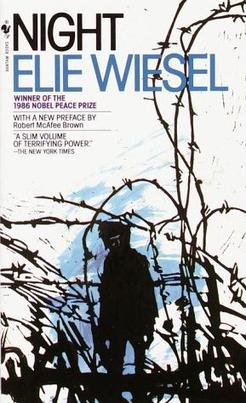
Night is a 1960 memoir by Elie Wiesel based on his Holocaust experiences with his father in the Nazi German concentration camps at Auschwitz and Buchenwald in 1944–1945, toward the end of the Second World War in Europe. In just over 100 pages of sparse and fragmented narrative, Wiesel writes about his loss of faith and increasing disgust with humanity, recounting his experiences from the Nazi-established ghettos in his hometown of Sighet, Romania, to his migration through multiple concentration camps. The typical parent–child relationship is inverted as his father dwindled in the camps to a helpless state while Wiesel himself became his teenaged caregiver. His father died in January 1945, taken to the crematory after deteriorating from dysentery and a beating while Wiesel lay silently on the bunk above him for fear of being beaten too. The memoir ends shortly after the United States Army liberated Buchenwald in April 1945.

Yom HaZikaron laShoah ve-laG'vurah, known colloquially in Israel and abroad as Yom HaShoah and in English as International Holocaust Remembrance Day, or Holocaust Day, is observed as Israel's day of commemoration for the approximately six million Jews murdered in the Holocaust by Nazi Germany and its collaborators, and for the Jewish resistance in that period. In Israel, it is a national memorial day. The first official commemorations took place in 1951, and the observance of the day was anchored in a law passed by the Knesset in 1959. It is held on the 27th of Nisan, unless the 27th would be adjacent to the Jewish Sabbath, in which case the date is shifted by a day.

Tikkun is a quarterly interfaith Jewish left-progressive magazine and website, published in the United States, that analyzes American and Israeli culture, politics, religion, and history in the English language. The magazine has consistently published the work of Israeli and Palestinian left-wing intellectuals, but also included book and music reviews, personal essays, and poetry. In 2006 and 2011, the magazine was awarded the Independent Press Award for Best Spiritual Coverage by Utne Reader for its analysis of the inability of many progressives to understand people's yearning for faith, and the American fundamentalists' political influence on the international conflict among religious zealots. The magazine was founded in 1986 by Michael Lerner and his then-wife Nan Fink Gefen. Since 2012, its publisher is Duke University Press. Beyt Tikkun Synagogue, led by Rabbi Michael Lerner, is loosely affiliated with Tikkun magazine. It describes itself as a "hallachic community bound by Jewish law".

Isaiah or Yeshayahu ben Avraham Ha-Levi Horowitz, , also known as the Shelah HaKaddosh after the title of his best-known work, was a prominent rabbi and mystic.

David Golinkin is an American-born conservative rabbi and Jewish scholar who has lived in Jerusalem since 1972. He is President of the Schechter Institutes, Inc., President Emeritus of the Schechter Institute of Jewish Studies and Professor of Jewish Law at the Schechter Institute of Jewish Studies in Jerusalem, Israel.
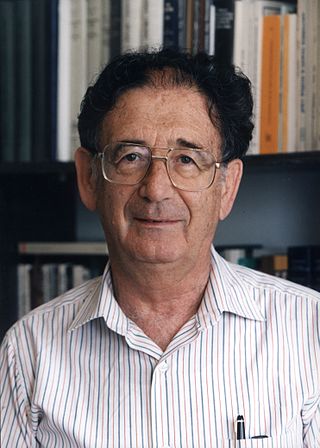
Yehuda Bauer is a Czech-born Israeli historian and scholar of the Holocaust. He is a professor of Holocaust Studies at the Avraham Harman Institute of Contemporary Jewry at the Hebrew University of Jerusalem.
The Encyclopedia of the Holocaust (1990) has been called "the most recognized reference book on the Holocaust". It was published in an English-language translated edition by Macmillan in tandem with the Hebrew language original edition published by Yad Vashem, the Holocaust Remembrance Authority in Israel. All its contributors are reputable Holocaust scholars and academics. Although the encyclopedia is easy to read and use and contains no disturbing pictures, it is not recommended for users younger than high school age.

Slomó Köves is a leading Orthodox rabbi and chief rabbi of EMIH an affiliate of Chabad-Lubavitch in Hungary which is led by rabbi Baruch Oberlander.

Tuvia Friling is an Emeritus professor at Ben-Gurion University of the Negev, Israel. Previously he served as a senior researcher at the Ben-Gurion Research Institute for the Study of Israel and Zionism and a lecturer at the Israel Studies Program both at Ben-Gurion University of the Negev.
Martyrdom in Judaism is one of the main examples of Jews doing a kiddush Hashem, a Hebrew term which means "sanctification of [the] name". An example of this is public self-sacrifice in accordance with Jewish practice and identity, with the possibility of being killed for no other reason than being Jewish. There are specific conditions in Jewish law that deal with the details of self-sacrifice, be it willing or unwilling.
Holocaust studies, or sometimes Holocaust research, is a scholarly discipline that encompasses the historical research and study of the Holocaust. Institutions dedicated to Holocaust research investigate the multidisciplinary and interdisciplinary aspects of Holocaust methodology, demography, sociology, and psychology. It also covers the study of Nazi Germany, World War II, Jewish history, religion, Christian-Jewish relations, Holocaust theology, ethics, social responsibility, and genocide on a global scale. Exploring trauma, memories, and testimonies of the experiences of Holocaust survivors, human rights, international relations, Jewish life, Judaism, and Jewish identity in the post-Holocaust world are also covered in this type of research.
The Prayer for the Welfare of the State of Israel, also known as Avinu Shebashamayim, is a prayer said in Religious Zionist and Conservative synagogues on Shabbat and Jewish holy days. The prayer requests divine providence for the State of Israel and its leaders, and that the exiled Jewish people be gathered in to the Land of Israel.
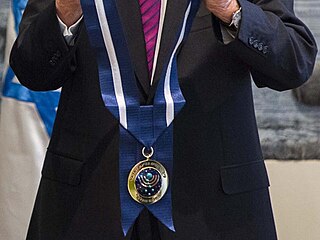
The Israeli Presidential Medal of Honor is the highest civil medal given by the President of the State of Israel.
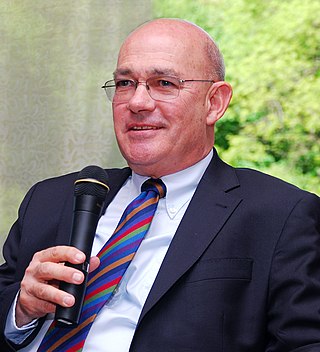
Tom Segev is an Israeli historian, author and journalist. He is associated with Israel's New Historians, a group challenging many of the country's traditional narratives.
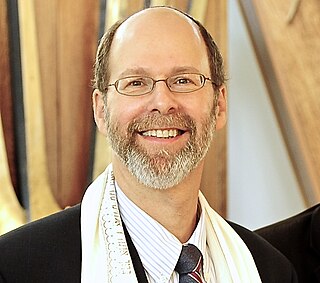
Eli Rubenstein is a Holocaust educator, writer, and filmmaker. He is currently the religious leader of Congregation Habonim Toronto, a Toronto synagogue founded by Holocaust survivors. He is also the National Director of March of the Living Canada, Director of Education for March of the Living International, Director of March of Remembrance and Hope Canada, and Chairman of the Canadian Friends of the Israel Guide Dog Center for the Blind.
"Like sheep to the slaughter" is a phrase that refers to the idea that Jews went passively to their deaths during the Holocaust. It derives from a similar phrase in the Hebrew Bible that favorably depicts martyrdom in both the Jewish and Christian religious traditions. Opposition to the phrase became associated with Jewish nationalism due to its use in Josippon and by Jewish self-defense groups after the 1903 Kishinev pogrom. During the Holocaust, Abba Kovner and other Jewish resistance leaders used the phrase to exhort Jews to fight back. In postwar Israel, some demonized Holocaust survivors as having gone "like sheep to the slaughter" while armed resistance was glorified. The phrase was taken to mean that Jews had not tried to save their own lives, and consequently were partly responsible for their own suffering and death. This myth, which has become less prominent over time, is frequently criticized by historians, theologians, and survivors as a form of victim blaming.
The Oxford University L'Chaim Society was a student society at the University of Oxford from 1989 to 2001. At its peak, it was the second-largest society within the University of Oxford.
Hillel Levine is an American social scientist, rabbi, and author. He was Professor of Religion at Boston University, where he served as the first director of the Center for Judaic Studies. In addition to books on Jewish history, he authored studies on social theory, comparative historical sociology, and the social epistemology of Judaism. He also served as Deputy Director for Museum Planning of the United States Holocaust Memorial Council, in which capacity he contributed to the preliminary planning of the United States Holocaust Memorial Museum.